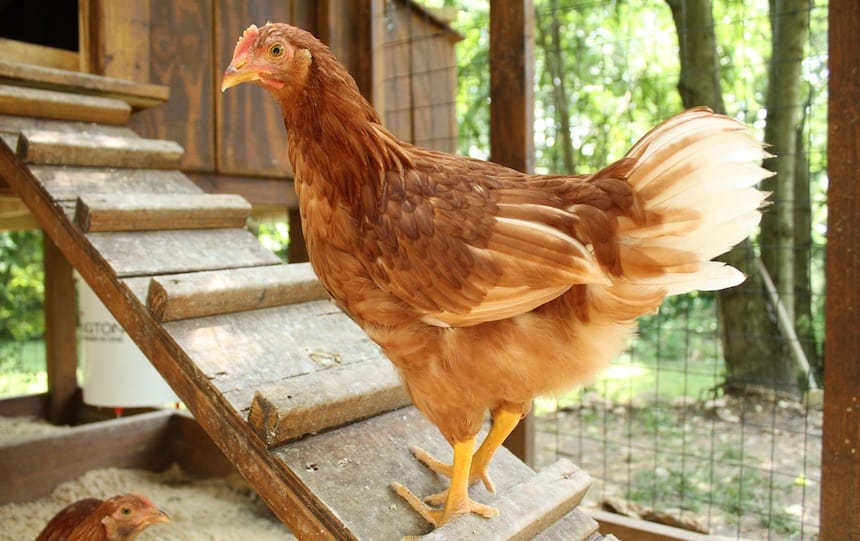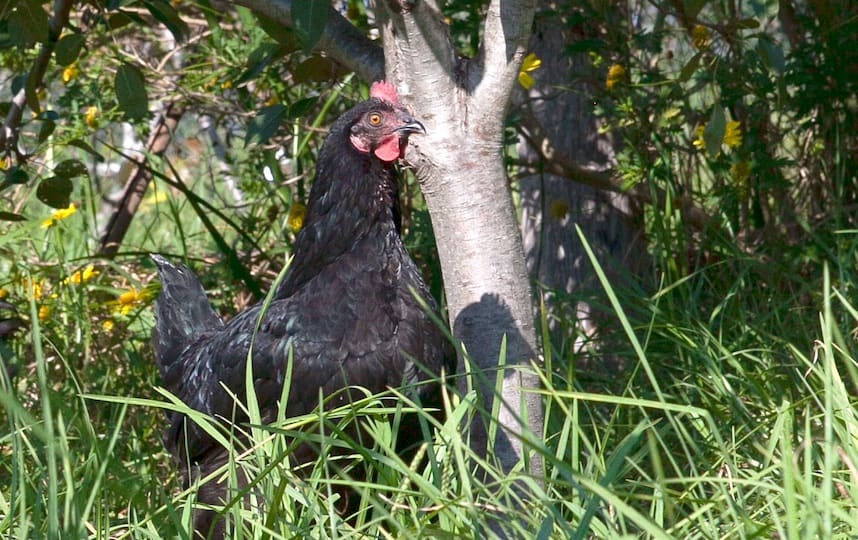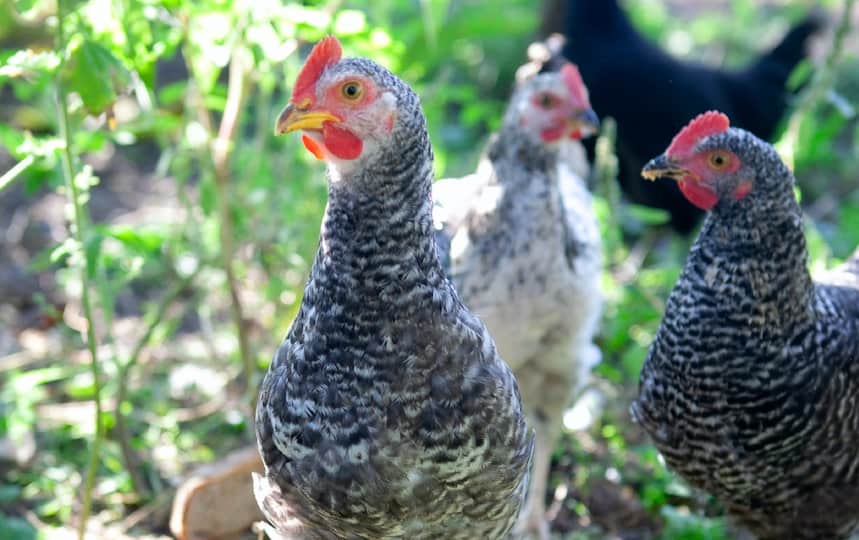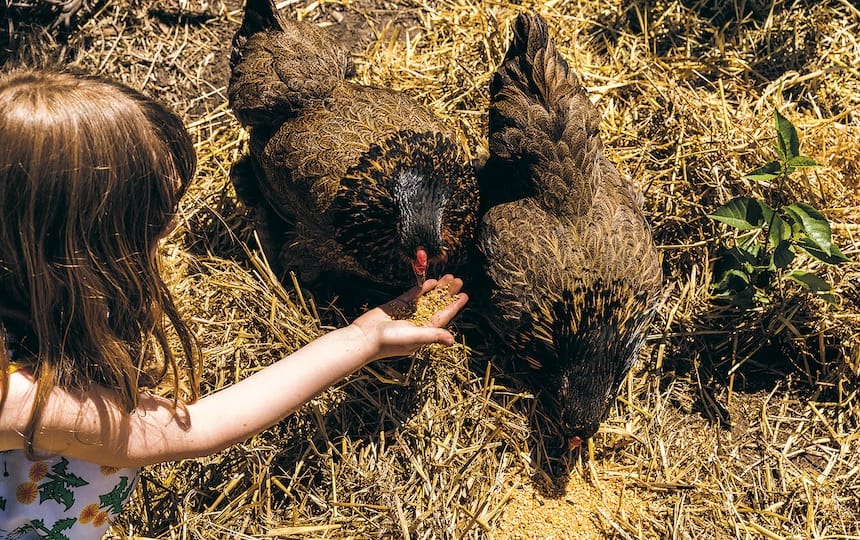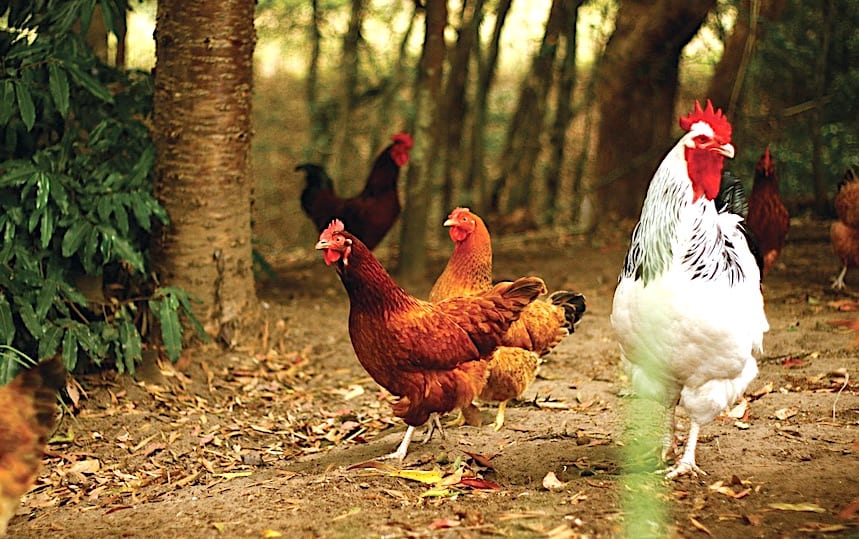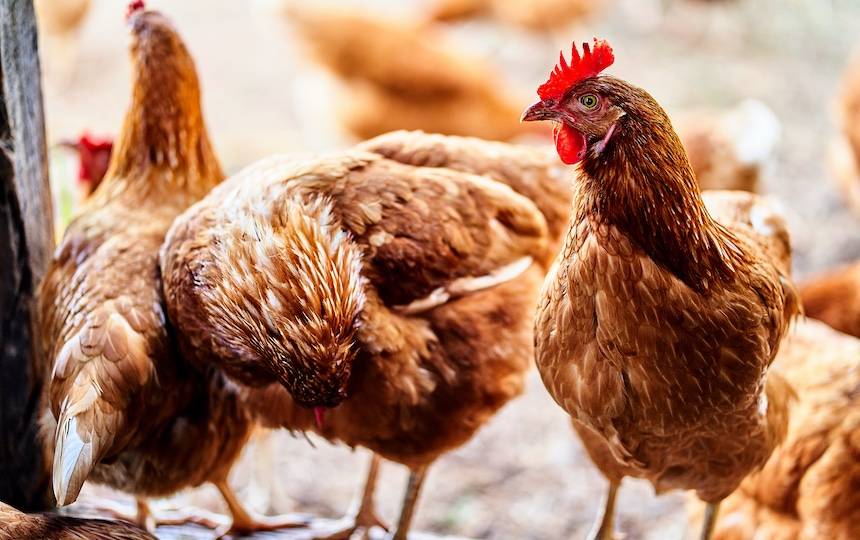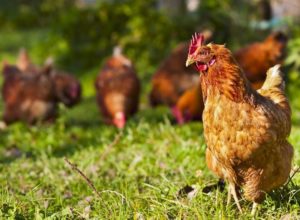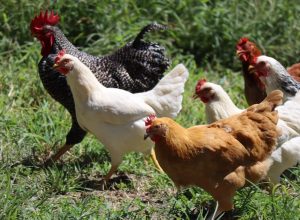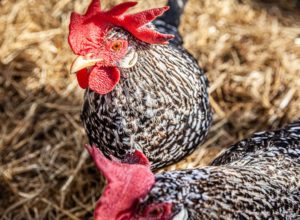Ready to start keeping chickens at home? Our easy beginner’s guide explains how to house them, what to feed them and how to keep them healthy.
The resurgence in keeping chickens in backyards has been climbing for the past decade.
If you are planning on setting up your first flock, or maybe have purchased some recently, and are thinking, “What now?” here are a few tips to make sure your chooks are happy and healthy.
What is the best chicken breed?
There are many breeds to choose from, so consider what your needs and priorities are.
Eggs, pets, meat, compost making, waste disposal and bug eating are all useful.
For urban backyards consider Bantam breeds. Bantam simply means a small breed; standard means full size.
For very small spaces, small children or nervous beginners, Pekins are ideal. They are small, friendly, fluffy, and make excellent pets.
However, the more fluff and decoration the less egg production, as energy goes into their appearance instead of eggs.
If you are aiming for higher egg production, consider Australorps, Langshans, Rhode-Islands or Leghorns, all of which are available in Bantam or standard size.
There are many other breeds to choose from, so do some research before rushing out to buy your first feathered friends.
Be wary of commercial breeds – in small spaces they are destructive, they tend to be short-lived and often develop health issues due to their high egg output.
Additionally, they need a higher protein diet to maintain health and egg productivity. By choosing a heritage breed instead, you support small breeders and help maintain the diversity of chooks available to us.
How much space do chooks need?
In our ever-shrinking backyards, space is at a premium. Consider all the activities you like to use the space for. Relaxing, veggie growing, fruit trees or exercising may be just a few of the things you would like to squeeze in.
Consider how you use the space, and whether you can “stack functions” or make the space multi-purpose. Can the chooks free range under the fruit trees? Can they share a lawn with the kids’ play area?
It is recommended that you allow a minimum of one square metre of space per hen of space, ideally providing a cosy coop where they can snuggle up at night and a fenced run where they can spend the day.
Utilise areas that are not suited for other activities, like the spot behind the shed, or the shady side of the house where nothing will grow.
Chook coops
Predator proofing is your top priority when it comes to keeping chickens, whether you are building or purchasing a coop. Foxes are the most common predator in mainland Australia, but you may also need to consider pythons, quolls, hawks or eagles.
Make sure the coop is fully enclosed, with a wire or solid floor. Check catches and hinges regularly as they are often the first to fail, and wire can rust after a couple of seasons in the rain.
Many of the flat-pack coops for keeping chickens available online are not designed to be long lasting. You may get a year or two out of them, but be prepared to do some reinforcing, and make sure there is a floor to prevent predators digging in.
If possible try to build your own, find a handy-person to build one for you, convert the kid’s cubby, or buy from a reputable seller.
What do I feed my chooks?
The easiest way to make sure your chooks are getting a balanced diet is to use a commercial pellet, although you could have a go at making your own. Look for a protein component of 16-18% and allow 100 grams or ½ a cup of pellets per hen per day.
A good quality feed will cost a little more, but the chooks don’t require as much, and it pays off in better egg production and health. There are also organic and vegetarian options available, so read the ingredients list.
Supplement the pellets with fresh scraps from the kitchen, weeds from the garden, and a handful of seed or scratch mix as a treat, and they will have nothing to complain about! Be careful not to overfeed, as it causes wastage, and pick-up leftovers for the compost, to discourage rats and mice.
Keeping your chooks healthy
There are a few basics when keeping chickens that are crucial. Make sure they have fresh water daily, especially in hot weather. Keep their feed dishes clean and dry. Hang water and feed dispensers up so they can’t walk or poo in them.
Clean out the coop monthly and replace all bedding and nesting material with fresh straw or shavings. If you are using a deep litter system, top up the bedding material regularly. Just like making compost, keep a balance of poo (nitrogen) to straw or shavings (carbon), to reduce smells, flies and the risk of disease.
Mites and lice are a common problem but can be hard to spot. Infestations can cause health problems for your chooks, so prevention is better than cure.
A sprinkle of Pestene powder in the nesting and sleeping area each month when you clean out the coop will prevent any outbreaks. Adding dried aromatic herbs, garlic skins or diatomaceous earth to their nesting boxes may help, but won’t treat an outbreak.
Intestinal worms can make your chooks seriously unwell. Keeping the coop clean and dry, removing droppings, and allowing them to free range on fresh grass will all help to break the worm life cycle.
However, to prevent or treat an outbreak use a commercial wormer three to four times a year, following the instructions closely. There are many home remedies, but be aware that they may be ineffective.
If you are concerned about your chook’s health, please consult a vet experienced in treating poultry. There are also many good books and websites available, so please look for reputable sources of information.
Chooks are a valuable addition to the home economy. Keeping chickens provides us with everything from eggs to companionship and as long as you provide them with some basic care, fresh food and water, and a secure nighttime coop, you will have many happy years of chook keeping ahead!
Want to know more about backyard chickens?
We’ve got loads of great content about keeping backyard chickens.
Issue #7 of Pip Magazine is our dedicated “chicken” issue, with articles on:
- How to keep your chicken flock healthy.
- A guide to the different backyard chicken breeds.
- Information on how to raise meat chickens.
- Plus, a troubleshooting guide, where we answer all of your questions and dilemmas around backyard chickens.
You can access these articles online here as part of our digital subscription offering.
Also check out our article on designing chickens into the vegie garden from Issue #6 of Pip here.
And don’t forget we have loads of chicken-related content online, including these articles:
- Breeding your own backyard chickens
- The perfect backyard chicken setup
- How and what to feed chickens
- Animal care: Summer chook care
- A guide to coloured chicken eggs
- Chicken breeds chart
- 7 alternative chicken feed ideas

